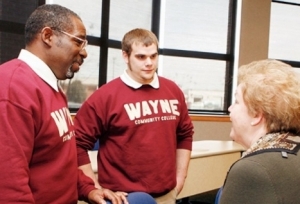Officials take close look at WCC work skills program
By Phyllis Moore
Published in News on March 5, 2009 1:46 PM

News-Argus/GREG SOUSA
Elaine Craft, right, director of the South Carolina ATE National Resource Center for Expanding Excellence in Technical Education, speaks with Wayne Community College industrial systems technology students Larry Whitfield, left, and Justin Gardner during a site visit recently to discuss outcomes of a National Science Foundation grant implemented at WCC two years ago.
Wayne Community College is doing a good job of expanding and diversifying its technical offerings, said representatives of a grant program designed to help community colleges prepare workers for the type of jobs they will hold in the future.
A team led by Elaine Craft, director of the South Carolina ATE National Resource Center for Expanding Excellence in Technical Education, toured the college last week. Wayne Community College became an "implementation site partner" two years ago in a National Science Foundation-funded four-year grant program. Ms. Craft and her team came to Wayne to discuss opportunities and outcomes for students.
While visiting several classes, she talked about the importance of shoring up technical programs and teaching students workforce readiness skills employers are looking for. The program has been in place for 15 years.
"When we started, only 12 percent of the students who entered our colleges in the field of industrial technology ever graduated. We knew that we needed to increase the diversity, the success of students, and we needed to make those numbers change," she said.
The team was not just interested in the college. It also evaluated the school's partnership with Wayne Early/Middle College High School, the School of Engineering and Wayne County Public Schools as a whole.
The relationships seem positive and heading in the right direction, Ms. Craft said.
"Working with people coast to coast, we don't have a partner any better than the one right here in Goldsboro," she said. "Their work has been outstanding. They're producing tremendous results."
Ms. Craft said it is crucial that schools develop solid programs that are not sustained simply by grant money.
"We look at this as a journey. Grants are short-lived. They come and go away. We are working from the beginning to try to put into place our practices, the partnerships that help after the grants go away."
That is where being nimble comes in, she said. Schools have to be able to shift emphasis to meet the needs of the job market.
"Community colleges are able to shift and respond to new technologies and employers in their area. We're actually only limited by our resources," she said.
One of the resources that has been especially helpful, she said, is the National Dropout Prevention Center. Fifteen strategies have been successful at all education levels throughout the nation -- school-community collaboration, safe learning environments, family engagement and mentoring/tutoring among them.
Young people today have many more choices of careers than in the past, Ms. Craft said. At the same time, it's essential to have them fully engaged in the educational process.
"We have young people who have just checked out .... We need to get them checked back into learning," she said. "If we could impress upon students how important it is and how cool it is, to get through the hard stuff -- you have to have math and some of the other subjects -- if you give them a good reason to do it. ... It's amazing what they can do when they're motivated."
The team spent last Wednesday sharing with campus leaders and officials and presenting information on curriculum development and implementation measures. They were then given a tour of the campus and its labs and sat in on presentations of student projects.
